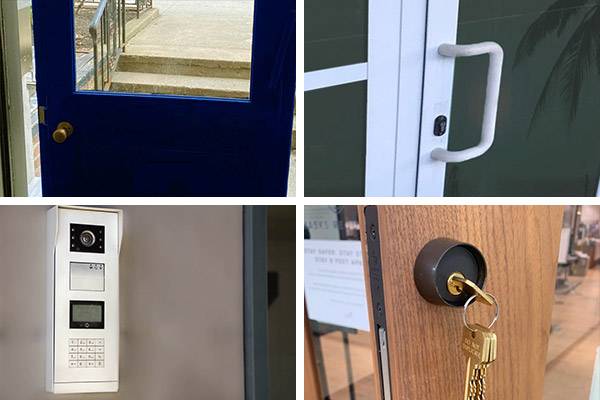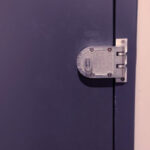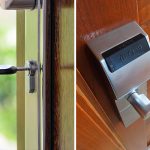
Explore the Most Popular Commercial Locks in Today’s Business
Security is a crucial priority in every establishment. Management is responsible for equipping the premises with essential safety measures to safeguard both employees and occupants.
Commercial door locks protect buildings from adverse weather, theft, and vandalism. The market offers a wide array of commercial door locks, making it important to understand their key differences to choose the most suitable option for your needs. Here’s a guide to various commercial locks that could enhance the security of your business.
Most Commonly Used Commercial Locks
Cylindrical Lever Locks
Cylindrical lever locks, also known as lever handle locks, are an exceptionally common type of commercial lock, distinguished by their cylindrical body and a lever that functions as the handle and the actuating mechanism. They are typically installed in commercial spaces due to their durability and ease of use.
Distinct features of cylindrical lever locks include their unique body and lever-like handle, which often incorporate a push-button or turn-button lock mechanism within the handle itself. This design enables individuals to easily open and secure doors, even when their hands are full – a significant advantage in a busy commercial setting.
Types of cylindrical lever locks can vary based on the locking mechanism (privacy, entrance, storeroom, or classroom function) and the level of security they offer. ‘Heavy Duty’ lever locks, for instance, are designed for areas with high traffic and require a higher level of security, while ‘Standard Duty’ locks are apt for areas with lower traffic and basic security needs.
Pros of cylindrical lever locks:
- User-friendly design.
- Variety of styles and finishes to match the interior.
- Suitable for high-traffic areas.
- ADA (Americans with Disabilities Act) compliant.
Cons of cylindrical lever locks:
- May not be as secure as deadbolts.
- The internal mechanism may wear out with heavy use.
When finding the perfect lock, cylindrical lever locks offer a winning combination of security, usability, and style. These versatile locks are a top choice for businesses, working seamlessly on office doors and storerooms. While they may not provide the same level of security as deadbolts, their numerous advantages make them an excellent option for many businesses. Trust in the reliability and charm of cylindrical lever locks to keep your premises secure and visually appealing.
Mortise Locks
Mortise locks are a popular type of commercial lock characterized by their large, heavy-duty lock body installed into a pocket or ‘mortise’ at the edge of the door. The distinct feature of a mortise lock lies in its lock body, which houses the mechanism for both the latch and the deadbolt. This design allows for integrating multiple functions in one lock, making it versatile for various commercial applications.
Different types of mortise locks can be classified based on their function – such as storeroom, entrance, privacy, classroom, or institutional. Moreover, mortise locks can also vary based on the type of cylinders, with possibilities ranging from conventional to interchangeable core cylinders.
Pros of Mortise Locks:
- Highly secure due to their robust design and construction.
- Versatile, serving multiple functions in one lock.
- Durable, withstanding heavy use over time.
- Available in a variety of styles and finishes.
Cons of Mortise Locks:
- Require professional installation due to their complex mechanism.
- May be more expensive than other types of locks.
- Regular maintenance is required to keep the mechanism functioning smoothly.
Selecting mortise locks can prove to be an exceptional choice for businesses that prioritize top-notch security and versatility. Despite requiring professional installation and maintenance, their sturdy design, multifunctionality, and long-lasting nature make them an appealing option for commercial establishments.
Keypad Door Locks
Keypad door locks, also known as electronic, utilize a numbered keypad instead of a traditional key to unlock the door. The user enters a pre-set numeric code, avoiding the need for physical keys and providing a higher level of control and convenience.
Distinct features of keypad door locks include a number pad (physical or touchscreen) and often a keyhole as a backup unlocking method. Some models also have advanced features such as built-in alarms, auto-locking functions, and connectivity with home automation systems.
There are two main forms of keypad door locks: standalone keypad locks and networked electronic locks. Standalone locks operate independently and are generally used for single-door security systems. On the other hand, networked locks are part of a larger security system and allow for remote management and audit tracking.
Pros of Keypad Door Locks:
- Keyless entry eliminates the risk of lost keys.
- Allows for multiple unique access codes for different users.
- Provides an audit trail, tracking who has entered and exited the door.
- The ability to change codes offers higher control over security.
Cons of Keypad Door Locks:
- More expensive than traditional locks.
- Requires a power source, usually battery-operated.
- Advanced models may require professional installation.
If you’re a business seeking better security control and convenience, opting for keypad door locks can be a game-changer. While they may require a higher initial investment than traditional locks, their advanced features, such as unique access codes and audit trails, offer superior safety measures that can be invaluable for a commercial setup.
Electric Strike Locks
Electric strike locks, often simply referred to as “electric strikes,” are an innovative type of commercial lock that uses electricity to control the locking mechanism. These locks are typically used with other types, such as cylindrical or mortise, but provide the added functionality of electronic access control.
Distinct features of electric strike locks include a strike plate with an electrically controlled hinge and an accompanying mechanism that can be locked or unlocked electronically. They are best suited for locations requiring high control and security, such as office buildings, government facilities, and schools.
Electric strike locks come in two main types: fail-safe and fail-secure. Fail-safe electric strikes unlock when power is cut, ensuring people can exit in case of a power failure. In contrast, fail-secure electric strikes stay locked when power is cut, protecting the premises from unauthorized access.
Pros of Electric Strike Locks:
- Greater control over access, as they can be remotely locked or unlocked.
- Can be integrated into broader access control and security systems.
- The fail-safe design allows for safe evacuation during power outages.
- Durable and designed to withstand high-traffic use.
Cons of Electric Strike Locks:
- More expensive to purchase and install compared to traditional locks.
- Require a continuous power source to operate.
- Professional installation is necessary due to their complexity.
If your business is all about security and access control, opting for electric strike locks can be a smart move. Despite the initial higher investment required and the need for professional installation, their benefits in terms of security, control, and integration with larger security systems make them a valuable addition to any commercial premises.
Keyless Locks
As the name suggests, keyless locks do not require a physical key to unlock the door. Instead, they utilize biometrics, RFID (Radio Frequency Identification), or Bluetooth to unlock the door. This smart locking system offers an advanced level of security and convenience compared to traditional keyed locks.
Distinct features of keyless locks include the absence of a traditional keyhole and the use of technology for access. These locks can often be controlled remotely through a smartphone app, and some models offer advanced security features such as built-in alarms and anti-tampering mechanisms.
There are several types of keyless locks available, including biometric locks that use fingerprint recognition. These smart locks utilize Bluetooth or Wi-Fi to connect with your smartphone, and RFID card locks open with a swipe of a card.
Pros of Keyless Locks:
- Enhanced security with advanced features like biometric recognition and anti-tampering mechanisms.
- Greater convenience as there’s no need to carry a physical key.
- Control access remotely through a smartphone, allowing for multiple user access.
- Ability to track and monitor access, providing an audit trail of who has entered and exited.
Cons of Keyless Locks:
- More costly than traditional locks due to advanced technology.
- Require a power source, typically battery-operated, which needs regular replacing.
- May need professional installation.
Choosing keyless locks can offer numerous benefits for businesses, especially those prioritizing advanced security and convenience. Although they may be more expensive initially, the long-term advantages of enhanced security, multiple user access, and audit trails make them a worthwhile investment for any commercial establishment.
Smart Locks
Smart locks represent the next generation of locking systems, combining traditional lock and key mechanisms with modern technology to enhance security and convenience. They offer keyless entry using a mobile app, a unique code, or even biometric data. One of the main distinguishing features of smart locks is their ability to connect to the Internet, allowing for remote control and monitoring of the lock’s status.
There are various types of smart locks in the market, including padlocks, deadbolts, lever handles, and wall-mounted smart locks. Some smart locks connect to your smartphone via Bluetooth or Wi-Fi, while others use RFID, keypad, or biometric technology for keyless entry. Some smart locks even integrate with home automation systems or virtual assistants like Alexa or Google Assistant.
Pros of Smart Locks:
- Enhanced security with remote access, real-time alerts, and audit trails.
- High convenience due to keyless entry and the ability to grant temporary access.
- Integration with home automation systems for increased functionality.
- Some models offer built-in alarms, auto-locking functions, and biometric features.
Cons of Smart Locks:
- They tend to be more expensive than traditional locks due to the technology involved.
- They require a power source, typically batteries, which need regular replacing.
- Internet-dependent models may be vulnerable to Wi-Fi disruptions and hacking.
Opting for smart locks can be a wise choice for businesses aiming to enhance security while providing the convenience of remote access and monitoring. Although the upfront cost may be higher, the long-term advantages of implementing a smart lock system, such as heightened security, user-friendliness, and integration capabilities, make it a valuable addition to any commercial property. As technology advances and intertwines with our daily lives, smart locks pave the way toward a more secure and convenient future.
Panic Bars
Panic Bars, also known as crash bars, exit devices, or push bars, are door exit devices that allow people to exit quickly from a building in case of an emergency. These devices are usually found on doors marked as emergency exits in commercial and institutional buildings, and they have become a crucial safety feature as they allow for swift and unobstructed exits during evacuations.
Distinct features of panic bars include a spring-loaded metal bar fixed horizontally to the inside of an outward-opening door. When the bar is pushed, it activates a mechanism that unlatches the door, allowing immediate exit. Depending on the requirements of the building, panic bars can be single-point or multi-point devices, relating to the number of latches they disengage when activated. They can also come with additional features, such as alarms that trigger when the device is activated.
Several types of panic bars exist, including crossbar-type, touchpad-type, and recessed panic bars. The crossbar type has a prominent bar across the door that is pushed to release the latch. The touchpad type has a flat push pad that extends at least half the width of the door. The recessed panic bars resemble touchpads but are installed within the door to maintain aesthetics.
Pros of Panic Bars:
- Quick and easy exit during emergencies, aiding in crowd control.
- Can be combined with a door alarm to alert authorities when the door has been opened.
- Reduces the chance of bottlenecks at exit points during an evacuation.
- Contributes to the safety compliance of a building, as they’re a requirement in many fire and safety regulations.
Cons of Panic Bars:
- Can be more expensive to install and maintain than standard door handles.
- Not aesthetically pleasing for some users due to their robust and industrial look.
Optimizing the safety and security of your commercial building is crucial, and panic bars can play a vital role in achieving that. Despite the relatively higher initial cost than traditional door handles, their benefits during emergencies make them an indispensable feature in any commercial establishment. Therefore, investing in panic bars would be wise to ensure the utmost safety and peace of mind for your premises.
Selecting the Right Commercial Lock: Key Considerations
Choosing the right commercial lock for your business is a critical decision. It’s not merely about securing the premises but also about ensuring the safety and convenience of your employees, customers, and assets. Here are a few key factors to consider when deciding on the most suitable commercial lock for your business.
- Security Level: The level of security needed largely depends on the nature of your business. High-risk businesses, such as banks or jewelry stores, may require high-security locks, while a small retail store might find a medium-security lock sufficient.
- Access Control: Consider how many people will need access to the building and whether you want to control who has access at certain times. Electronic and smart locks are ideal for businesses requiring advanced access control features.
- Durability: Commercial locks should be robust and durable to withstand heavy use and attempts at forced entry. Look for locks made from strong materials like steel or brass and with anti-drill and anti-pick features.
- Ease of Use: Although security is paramount, you’ll also want a lock that’s easy to use. Keyless or smart locks are good options as they offer convenience without compromising security.
- Cost: Lastly, consider your budget. While higher-end locks offer more features and better security, they’re also more expensive. Strike a balance between cost and security based on your specific business needs.
Remember, it’s imperative to consult with a professional locksmith, like Cobra Locksmith in New York, who can assess your business and provide expert advice on the best commercial lock system tailored to your needs.
Get Your Ideal Commercial Lock with Cobra Locksmith in New York
Selecting the appropriate commercial lock for your business is paramount. It guarantees security, convenience, and adherence to safety regulations. Whether it’s traditional locks, keyless systems, or panic bars, understanding their features and pros and cons can help you make an informed decision that fits your specific needs.
With technology constantly evolving, it’s essential to stay up-to-date with the latest advancements in commercial locks to ensure the safety and security of your business. So, consider exploring all available options and consult a professional locksmith to choose the best commercial lock for your establishment. Your business’s security is not something to compromise on, so invest in reliable, high-quality locks that provide peace of mind for you and your employees.
Keep your commercial property safe and secure with the right locks from Cobra Locksmith, serving New York’s service area. Continue reading our content for more valuable tips and information on commercial locks and other security solutions. Let us help you safeguard your business so that you can focus on growing and succeeding in today’s competitive market.
Call now for a locksmith Brooklyn NY

 347-797-1671
347-797-1671



 +1 347-797-1671
+1 347-797-1671 info@cobralocksmiths.com
info@cobralocksmiths.com Connect with us
Connect with us
 Tap Here To Call Us
Tap Here To Call Us

Comments are closed here.